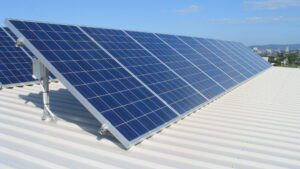10 Tips How To Save Electricity For Your Business

As businesses continue to grow and expand, so does their energy consumption. With the rising cost of electricity in Singapore and the need to reduce greenhouse gas emissions, it has become more important than ever for businesses to focus on energy efficiency. In this article, we will explore how businesses in Singapore can save electricity by conducting energy audits, implementing energy-saving measures, optimizing building operations, and participating in energy-saving programs.
Conducting an Energy Audit
The first step in saving electricity for businesses is to conduct an energy audit. This involves identifying patterns of energy consumption, determining areas of high energy consumption, and finding opportunities for improvement.
Identifying Patterns of Energy Consumption
The first step in conducting an energy audit is to identify patterns of energy consumption. This can be done by analyzing energy bills and usage data. By understanding how and when energy is being used, businesses can identify areas of high energy consumption and develop strategies to reduce energy usage.
Determining Areas of High Energy Consumption
Once patterns of energy consumption have been identified, the next step is to determine areas of high energy consumption. This can include areas such as lighting, heating, ventilation, and air conditioning (HVAC), and office equipment. By identifying areas of high energy consumption, businesses can focus their efforts on implementing energy-saving measures in these areas.
Finding Opportunities for Improvement
The final step in conducting an energy audit is to find opportunities for improvement. This can include recommending energy-saving measures such as the adoption of energy-efficient equipment and appliances, the installation of sensors and timers for lighting and HVAC systems, and the implementation of employee education and awareness programs. By identifying these opportunities, businesses can develop a plan to improve their energy efficiency.
The Energy Market Authority (EMA) in Singapore provides guidelines and resources for businesses to conduct energy audits and improve their energy efficiency. The Green Mark Certification scheme, administered by the Building and Construction Authority (BCA), encourages businesses to adopt sustainable building practices and reduce their energy consumption.
Implementing Energy-Saving Measures
Once opportunities for improvement have been identified, the next step is to implement energy-saving measures. This can include adopting energy-efficient equipment and appliances, installing sensors and timers for lighting and HVAC systems, implementing employee education and awareness programs, and setting energy-saving targets.
Adopting Energy-Efficient Equipment and Appliances
One way businesses can save electricity is by adopting energy-efficient equipment and appliances. This includes upgrading to more energy-efficient lighting, HVAC systems, and office equipment. By using equipment that consumes less energy, businesses can significantly reduce their electricity bills.
Installing Sensors and Timers for Lighting and HVAC Systems
Installing sensors and timers for lighting and HVAC systems can also help businesses save electricity. Sensors can detect when a room is empty and automatically turn off lights and HVAC systems, reducing energy consumption. Timers can be used to control the operation of HVAC systems, ensuring they are only operating when necessary.
Implementing Employee Education and Awareness Programs
Employee education and awareness programs can also help businesses save electricity. By educating employees on the importance of energy efficiency and providing tips on how to conserve energy, businesses can create a culture of energy efficiency within their organization. This can lead to significant reductions in energy consumption.
Setting Energy-Saving Targets
Setting energy-saving targets is an important step in improving energy efficiency. By setting targets, businesses can track their progress and identify areas where further improvements can be made. The National Environment Agency (NEA) provides guidelines and resources for businesses to set energy-saving targets.
Optimizing Building Operations
Optimizing building operations is another important way that businesses can save electricity. This can include improving building insulation and weatherization, optimizing building automation systems, and conducting regular maintenance and inspections.
Improving Building Insulation and Weatherization
Improving building insulation and weatherization can significantly reduce energy consumption. By properly insulating a building, businesses can reduce the amount of energy needed to heat or cool the building. Weatherization measures, such as sealing air leaks, can also help to reduce energy consumption by preventing the escape of conditioned air.
Optimizing Building Automation Systems
Building automation systems can help businesses save electricity by optimizing building operations. These systems can be used to control lighting, HVAC, and other systems, ensuring they are only operating when necessary. By optimizing building automation systems, businesses can reduce energy consumption and improve energy efficiency.
Conducting Regular Maintenance and Inspections
Regular maintenance and inspections are essential to maintaining energy efficiency in buildings. This includes inspecting HVAC systems, replacing air filters, and cleaning coils. Regular maintenance and inspections can help to ensure that building systems are operating efficiently and can identify areas where improvements can be made.
Participating in Energy-Saving Programs
Participating in energy-saving programs is another way that businesses can save electricity. This can include seeking government grants and incentives for energy efficiency projects, joining the Energy Efficiency National Partnership program, and partnering with energy service companies.
Seeking Government Grants and Incentives
The Singapore government provides grants and incentives to businesses that adopt energy-efficient practices. These grants and incentives can help to offset the cost of implementing energy-saving measures and can make it easier for businesses to improve their energy efficiency.
Joining the Energy Efficiency National Partnership Program
The Energy Efficiency National Partnership program is a voluntary program that encourages businesses to improve their energy efficiency. Businesses that participate in the program commit to reducing their energy consumption by a certain percentage each year. In return, they receive support and resources from the government to help them achieve their energy-saving goals.
Solar Panel For Your Business

Solar panels can provide significant benefits for businesses looking to save on electricity costs and reduce their carbon footprint. Here are some of the ways that solar panels can help businesses save electricity:
- Generating electricity: Solar panels convert sunlight into electricity, which can be used to power your business. By using solar energy instead of electricity from the grid, your business can significantly reduce its electricity bills. The more electricity your solar panels generate, the less you need to purchase from the grid, which can result in significant savings over time.
- Net metering: Net metering is a program that allows businesses to receive credit for any excess electricity generated by their solar panels. This means that during times when your solar panels produce more electricity than your business needs, the excess electricity can be fed back into the grid and you can receive credits that can be used to offset your electricity bills. In some cases, businesses can even receive a check from their utility company for the excess electricity they generate.
If you would like to install solar panel for your business you can contact us here.
Conclusion
In conclusion, saving electricity is important for businesses in Singapore. By conducting energy audits, implementing energy-saving measures, optimizing building operations, and participating in energy-saving programs, businesses can significantly reduce their energy consumption and improve their energy efficiency. The benefits of energy efficiency for businesses include reduced energy bills, improved environmental performance, and a more sustainable future for Singapore. By taking action now, businesses can help to create a more energy-efficient and sustainable Singapore for future generations.
